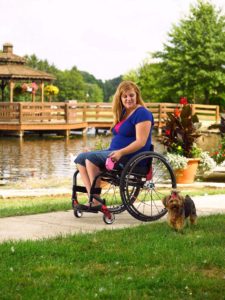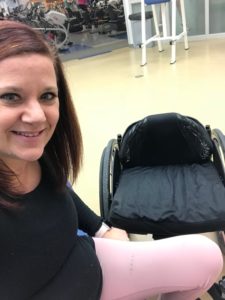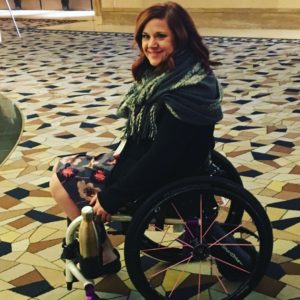The definition of independence leaves room for interpretation. Which is a good thing after a traumatic event, such as a spinal cord injury. Read on to learn more.
Disclosure: There are some affiliate links below, but these are all products I highly recommend. I won’t put anything on this page that I haven’t verified and/or personally used. You can read my full disclosure here.
 One of my goals for this blog is to help motivate and inspire people to live lives as independently as possible after a spinal cord injury (SCI). But, what does it really mean to be independent? This definition will change from person to person, as all injuries are unique and the needs of one person might not be the needs for another person, even if they have the same level of injury.
One of my goals for this blog is to help motivate and inspire people to live lives as independently as possible after a spinal cord injury (SCI). But, what does it really mean to be independent? This definition will change from person to person, as all injuries are unique and the needs of one person might not be the needs for another person, even if they have the same level of injury.
Independence Defined
First, let’s start out with how independence is defined. We need a starting place. Looking up “independence,” all I found was “the state of being independent.” So, I looked up independent. As an adjective, there are three different definitions that we can use. Those are:
“Free from outside control; not depending on another’s authority;”
“Not depending on another for livelihood or subsistence;”
“Not connected with another or with each other; separate.”
If we strictly look at the first definition of independent, we could have so much room for interpretation. “Not depending on another’s authority” could mean a person with a SCI dictating to a caregiver what he/she needs, or wants, to do. Just because you cannot physically complete a task does not mean you cannot be independent. Independence can be redefined as advocating for yourself, what you want to do, and how you want to do it. It can be doing what you want, with the help you need.
Redefining the term
In an article about redefining independence in New Mobility magazine, by Ian Ruder, a C5-6 quad, Dave Pierson, was quoted as saying that “now, independence is dictating life rather than life dictating to me. It’s more about doing what I want to do when I want to do it with whatever help I need – and knowing I am able to get that help” (October 2017). To me, this perfectly sums up how independence can be redefined after a SCI.
To many, independence is the second two definitions stated above. It’s being able to do everything on one’s own. But, after a trauma in which you cannot physically move/use part or most of your body, those terms just simply do not work. Shifting your perspective of what independence means can open up so many possibilities. 
My level of injury is not “very high” when comparing to cervical injuries where hand, arm, and head functions can be extremely limiting. I was lucky in a sense that I have full function of my arms and hands, and for the most part, I don’t need help. When comparing to other paras, I am at the higher end. I do not have any trunk balance or control, so unless I have some sort of a back to a seat, I don’t have a chance of using my arms to do anything functional. I’m working on it, but it’s not there yet. And, obviously, I need help reaching in high places, or underneath furniture. Do I need a personal care attendant? No, I do not.
When it comes to shifting a perspective about using caregivers and attendants in order to reach a level of independence, someone said that even though he was dependent on a caregiver, they were vital to his independence. Someone else was quoted by saying that she could use a stick to grab something, or she could use another person. Learning how to use the person effectively was the key for her independence.
Here is how I look at it, as a T-4 complete, paraplegic:
We all need different tools and modifications during different times in our lives, no matter if we have a SCI or not. It’s learning how to use those tools that will determine our independence and satisfaction in life. I have grabbers strategically placed in my house (and car) because I know there are some things that I simply cannot reach without one. Or, because using one will make something easier for me. I also keep a selfie stick in my purse, not for selfies, but because the part that holds the phone is perfect for knocking something down from the top shelf in a store.
Finding little modifications, such as my selfie stick “reacher,” or knowing what big tools/resources you need is one part of redefining your independence. It all boils down to your unique situation. When working with attendants or caregivers, there is a fine line of pushing your body to do something that is difficult and asking for help. On one hand, doing something for yourself is the ultimate goal for independence, but could take a lot of extra time and can wear a person out.
An example on myself
I know that I could get on the ground (out of my chair) and crawl underneath my kitchen table to pick something up. Or, if within reach, I could get a grabber and struggle for a little bit to pick it up. Or, I could wait until someone comes over (depending on the object that I dropped of course) and ask them to pick it up for me. The last option would obviously be the easiest, and getting on the floor is obviously the hardest (and most independent), but it all depends on how much time and effort I want to put into picking up whatever object it was that I dropped.
Another example (for someone with a higher injury) could be putting on socks and shoes. That person might be capable of doing it, but if his/her “getting ready” routine is already one to two hours, that person might decide to have his/her attendant go ahead and put the shoes and socks on because it would take 20-30 more minutes if trying to do it on his/her own.
It all comes down to time, energy, and your thoughts.
Your thoughts. Your perspective. Your mindset. I cannot talk about these things enough. Change your thoughts to change your life.
One more thing!
With the rise of technology more and more “freedom” can happen. There are apps and devices that can be used to voice activate almost anything that you need. There is computer software available – Dragon Naturally Speaking is the one I have heard about, that allows an user to control the computer with voice activated commands. I don’t know much about it, but I hear wonderful things. I can use my Amazon Echo and Alexa app to help with things around the house, or apps on my phone to help me when I am out and about. My apple watch let’s me be in charge of my fitness, as well as use phone and text without having my phone in hand. Or, adding a SmartDrive to my manual chair would allow me to save my shoulders AND take me longer distances.
These things cannot replace our mind and our thoughts. But, they can be used as a tool or resource in addition to our mindset. Knowing that these are available will help with planning how they can be used in your life. What are some other ways in which they can be incorporated into daily living? What are other tools and resources out there?
The way you define independence has to be unique to your needs. I’m hoping that seeing my perspective on how it can be different for different people will help spark you to start thinking about your life. Your life is still independent and how resources and tools can be incorporated to get more out of life. As always, leave me some feedback either here – below this post, e-mail me (megs@thewheellifeblog.com), or on any of my social media platforms! (FB/IG/TW @wheellifeblog and Snapchat @megsh8). I would love to hear from you and what I can do to help.

Megs